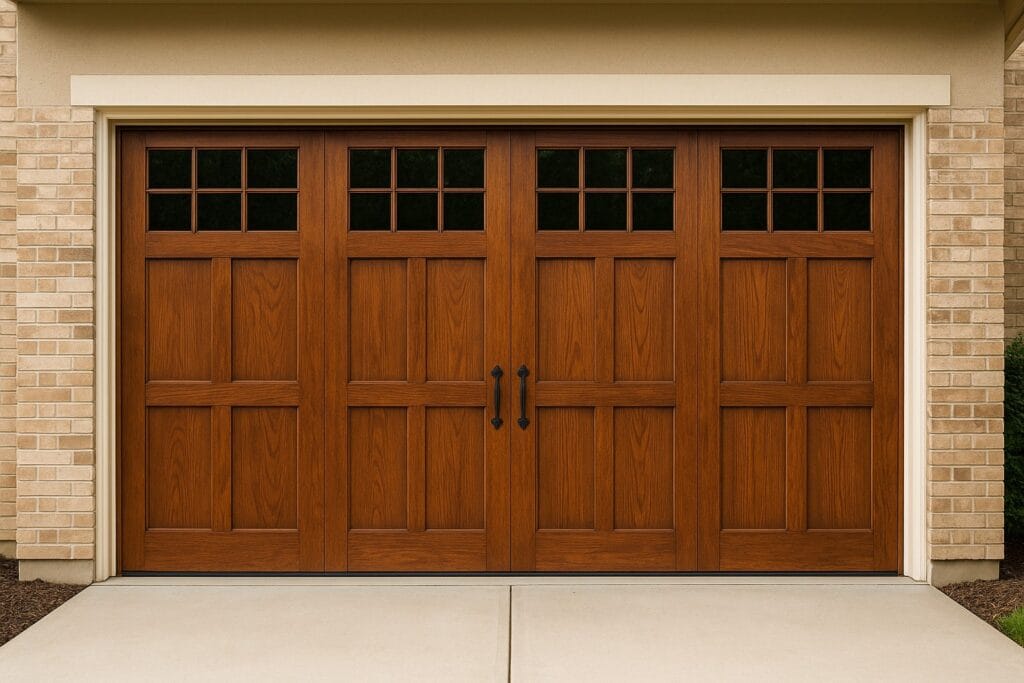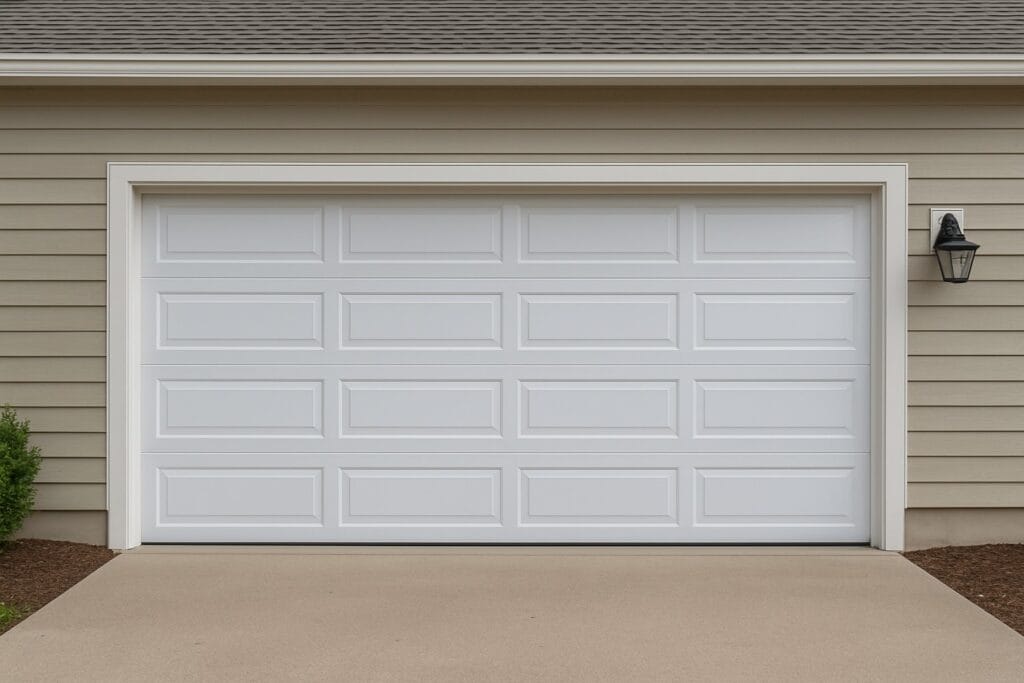Steel vs. Wood: Choosing the Right Material for Your Residential Garage Door Installation in Richmond
By Covey Trails Garage Doors Co.
Earlier this year, in Richmond, TX, a client contacted us about replacing their old worn-out wooden garage door that had seen better days. The panels were splitting, the torsion springs had lost their strength, and the garage door opener could barely lift it. The homeowners weren’t sure whether to stick with wood or explore modern options like steel. We conducted an on-site inspection, checked the garage door opening measurements, reviewed the garage door system, and presented them with side-by-side comparisons of both materials. After learning about insulation, R-value, and long-term maintenance, they opted for a new, energy-efficient steel garage door with heavy-duty torsion springs and safety sensors. Their home’s curb appeal skyrocketed, and their energy bill went down.
Here’s a fact that may surprise you: according to industry studies, a properly insulated garage door can reduce your home’s energy consumption by up to 25%, especially in variable climates like we have in Richmond. That’s why choosing the right material for your residential garage door installation is about more than just looks, it’s about efficiency, safety, and long-term savings.
Whether you’re a homeowner replacing an old garage door or outfitting a newly built garage, understanding the pros and cons of wood vs. steel is a critical step in the garage door installation process. Below, we’ll walk you through every key consideration to help you make the right decision.
Understanding Your Options: Steel vs. Wood for Your Residential Garage Door
Both steel and wood garage doors have unique strengths. When planning your garage door installation, it’s important to consider not only the appearance but also performance, insulation, required tools, and installation instructions.
Wood garage doors offer natural beauty and charm, often enhancing curb appeal with custom panels, ornate hinges, and rich finishes. However, they require more maintenance and are more susceptible to Richmond’s humid weather.
Steel garage doors, on the other hand, are known for their durability, resistance to warping, and compatibility with garage door openers and torsion spring systems. They’re easier to maintain, cost-effective, and available in styles that mimic wood grain if you want the look without the upkeep.
The Beauty and Craftsmanship of Wood Garage Doors

Visual Style and Customization
Wood brings unmatched character to a residential garage door installation. Whether you’re aiming for a carriage house look or a sleek modern design, wood can be custom-cut, carved, and stained to match your home’s architectural style. You can choose from various garage door sections, including raised panels, recessed panels, or flush designs.
Thermal and Sound Insulation
Due to its natural density, wood offers good insulation against both temperature and noise. While not always rated with a specific R-value, thick wooden garage door panels perform well in temperature control, helping regulate the garage opening environment.
Installation Process
Installing a wooden door involves careful handling of heavier panels, alignment of brackets, and secure placement of the torsion tube, center bracket, and flag brackets. The installation process can be time-consuming and requires the right tools, including a vise grip, zinc hex lags, and hinges rated for heavy loads.
Maintenance and Durability
One downside is that wood needs frequent routine maintenance to resist warping, rot, and insect damage. Staining or sealing must be part of your seasonal to-do list. Wooden garage doors also require regular checks on spring tension to ensure safe operation, as the door’s weight puts added stress on the torsion springs and horizontal tracks.
The Strength and Versatility of Steel Garage Doors

Superior Strength for Safety and Security
Steel garage doors are built for strength. The material resists dings, warping, and rot, and when combined with torsion spring systems and safety sensors, ensures smooth operation and better protection for your family and valuables. Their rugged build enhances garage security, especially when paired with smart garage door openers and auto-locking systems.
Cost-Effective and Low Maintenance
For budget-conscious homeowners, steel garage doors offer serious value. They are generally more affordable than wood, both in upfront cost and ongoing maintenance. Many steel doors come factory-finished with coatings that resist rust and fading, requiring minimal upkeep.
Insulation and Energy Efficiency
Modern steel garage doors often include foam core insulation like polyurethane or polystyrene, improving the R-value and energy efficiency of your garage. This is especially beneficial in Richmond, where controlling energy consumption during hot summers can make a noticeable impact on your utility bills.
Step-by-Step Installation
Installing a steel door is more straightforward than installing a wood door. The process involves attaching the garage door panels to the vertical track, aligning the bottom panel with the garage opening, installing torsion springs and drums, and anchoring the cables, brackets, and safety sensors. Each section locks into place with precision, ensuring proper operation and safe installation.
Comparing Steel and Wood Garage Doors: A Side-by-Side Guide
Let’s explore how both materials compare across various essential features:
Feature | Wood Garage Doors | Steel Garage Doors |
Visual Appeal | Warm, traditional, customizable | Sleek, modern, can mimic wood |
Maintenance Needs | High (painting, sealing) | Low (occasional cleaning) |
Durability | Prone to warping, insect damage | High resistance to weather, pests |
Installation Complexity | Heavy, needs expert handling | Lightweight, easier to install |
Insulation | Natural but variable | High R-value with insulation options |
Cost | Higher upfront and upkeep | More budget-friendly |
Eco-Friendliness | Renewable with high resource use | Recyclable and efficient |
Lifespan | Long with regular care | Long with minimal care |
Real-Life Richmond Concerns: Climate, Safety, and Energy Use
Climate Challenges
In Richmond, heat, humidity, and unexpected storms can test your garage door’s materials and parts. Wood expands and contracts with moisture, impacting the alignment of tracks, hinges, and brackets, while steel garage doors resist these fluctuations, ensuring reliable door operation year-round.
Garage Safety Features
No matter the material, every modern garage door installation should include safety sensors, a reliable garage door opener, and a well-calibrated torsion spring system. Improper spring tension or a loose cable drum can lead to injuries or malfunction.
Energy Savings and Comfort
A properly insulated garage door, especially one with insulated garage door sections, helps maintain indoor comfort. It prevents conditioned air from escaping and keeps dust, pests, and excess humidity out of the garage space.
What Style Suits Your Home Best?
From a visual standpoint, your choice may come down to the aesthetic. Do you own a ranch-style or colonial home in Richmond? A rich, stained wood garage door may blend seamlessly. Own a modern or mid-century property? A minimalist, insulated steel garage door with narrow panels and a high-tech garage door opener might be ideal.
Thanks to technological advances, many steel doors now offer faux-wood finishes that replicate the warmth of wood without the high maintenance, combining form and function.
How Can Covey Trails Garage Doors Co. Help You?
At Covey Trails Garage Doors Co., we specialize in helping Richmond homeowners choose, design, and install the perfect garage door system—tailored to your style, safety needs, and budget. Whether you want to upgrade to a new insulated steel garage door or restore your home’s classic charm with a custom wooden garage door, our technicians are here to guide you every step of the way.
What We Offer:
- Expert residential garage door installation
- Full-service garage door repairs (springs, openers, cables, brackets, and more)
- Custom garage door opener setups for smooth, quiet operation
- Precision calibration of spring tension, track alignment, and panel leveling
- Regular maintenance packages to extend the door’s lifespan
- Emergency service calls for stuck or damaged doors
Our team uses only high-quality parts from trusted garage door manufacturers, and we bring every necessary tool to the job—from torsion tubes and brackets to drums, cones, and hinges.
📍 Visit us at:
1646 Blaisdale Rd, Richmond, TX 77406, United States
📞 Call us today:
(713) 401-9063
🔧 Ready to upgrade your garage door?
Let us walk you through the step-by-step guide for a successful installation and match you with a door that brings value, performance, and style to your home.
Trust Covey Trails Garage Doors Co.—Richmond’s local experts in everything from new garage door installations to advanced garage door opener systems.
Professional. Reliable. Local.
That’s the Covey Trails promise.
Frequently Asked Questions (FAQs)
1. Can I paint or stain my steel garage door to match my home’s exterior?
Yes, most steel garage doors can be painted with latex-based exterior paint after proper surface preparation to ensure the finish adheres well.
2. How long does a typical garage door installation take for residential homes?
A standard residential garage door installation usually takes between 3 to 6 hours, depending on door type, size, and site conditions.
3. Do steel garage doors rust over time?
While uncoated steel can rust, modern steel garage doors are usually galvanized or coated with rust-resistant finishes that prevent corrosion for many years.
4. Are wood garage doors a good choice for hurricane-prone areas?
Wood garage doors are generally heavier and less impact-resistant than reinforced steel models, so they may not be the best option without additional bracing or storm-rated upgrades.
